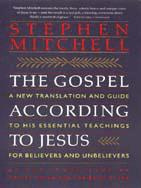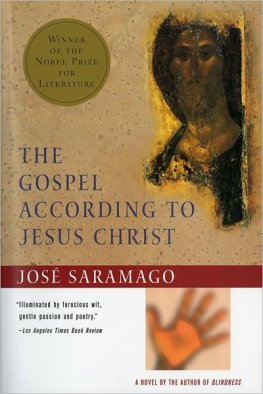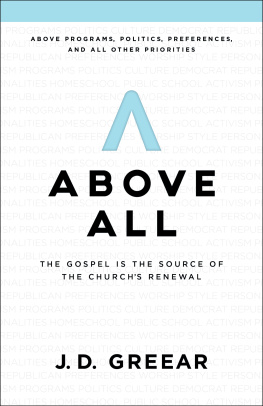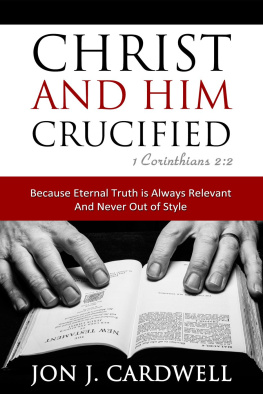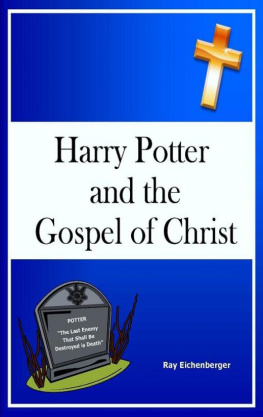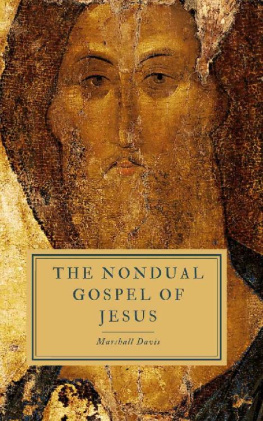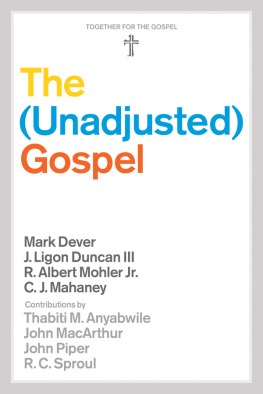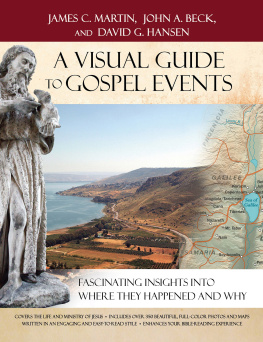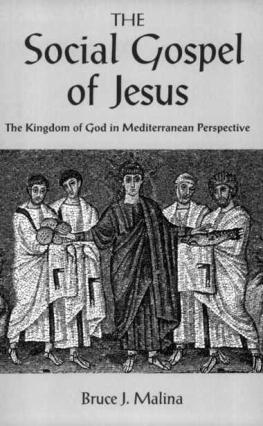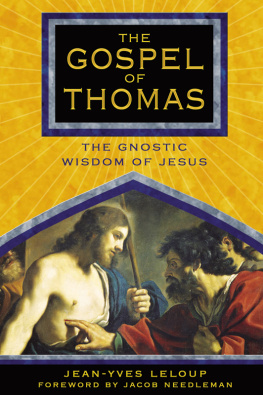Mitchell - The Gospel According to Jesus
Here you can read online Mitchell - The Gospel According to Jesus full text of the book (entire story) in english for free. Download pdf and epub, get meaning, cover and reviews about this ebook. year: 2009, publisher: Harper Collins, Inc., genre: Religion. Description of the work, (preface) as well as reviews are available. Best literature library LitArk.com created for fans of good reading and offers a wide selection of genres:
Romance novel
Science fiction
Adventure
Detective
Science
History
Home and family
Prose
Art
Politics
Computer
Non-fiction
Religion
Business
Children
Humor
Choose a favorite category and find really read worthwhile books. Enjoy immersion in the world of imagination, feel the emotions of the characters or learn something new for yourself, make an fascinating discovery.
The Gospel According to Jesus: summary, description and annotation
We offer to read an annotation, description, summary or preface (depends on what the author of the book "The Gospel According to Jesus" wrote himself). If you haven't found the necessary information about the book — write in the comments, we will try to find it.
The Gospel According to Jesus — read online for free the complete book (whole text) full work
Below is the text of the book, divided by pages. System saving the place of the last page read, allows you to conveniently read the book "The Gospel According to Jesus" online for free, without having to search again every time where you left off. Put a bookmark, and you can go to the page where you finished reading at any time.
Font size:
Interval:
Bookmark:

ACCORDING
TO JESUS

Introduction
Notes
The Gospel
Commentary
Baptism
He Begins to Teach
The First Disciples
At Capernaum
First Healings
He Heals a Leper
The Kingdom of God (1)
The Kingdom of God (2)
The Kingdom of God (3)
The Inner Light (1)
With the Wicked
The Twelve
He Heals a Paralytic
The Beatitudes
The Inner Light (2)
Fulfilling the Law
Charity
Prayer
The Inner Light (3)
Trust
Providence
You Receive Exactly What You Give
The Narrow Gate
Hearing and Doing
Jesus Family (1)
Accusations of Sorcery
Jesus Family (2)
Two Healings
Rejection in Nazareth
The Syrophoenician Woman
He Heals a Deaf Man, a Blind Man
An Exorcism
You Must Become Like Children (1)
Forgiveness
The Good Samaritan
The Lost Sheep and the Lost Coin
The Prodigal Son
You Must Become Like Children (2)
The Rich Man
Let the Dead Bury Their Dead
First Days in Jerusalem
The Tax to Caesar
The Greatest Commandment
The Woman Caught in Adultery
Gethsemane
The Arrest
Peters Denial
The Trial Before Pilate
The Crucifixion
Appendixes
Appendix 1: On Jesus
Appendix 2: On Healing
Appendix 3: On Miracles
Sources
Acknowledgments
About the Author
Credits
Cover
Copyright
About the Publisher
One of the icons on the walls of my study is a picture of Thomas Jefferson, an inexpensive reproduction of the portrait by Rembrandt Peale. The great man looks down over my desk, his longish, once-red hair almost completely gray now, a fur collar draped softly around his neck like a sleeping cat, his handsome features poised in an expression of serenity, amusement, and concern. I honor his serenity and understand his concern. And I like to think that his amusementthe hint of a smile, the left eyebrow raised a fraction of an inchcomes from finding himself placed in the company not of politicians but of saints.
For among the other icons on my walls are the beautiful, Jewish, halo-free face of Jesus by Rembrandt from the Gemldegalerie in Berlin; a portrait of that other greatest of Jewish teachers, Spinoza; a Ming dynasty watercolor of a delighted bird-watching Taoist who could easily be Lao-tzu himself; a photograph, glowing with love, of the modern Indian sage Ramana Maharshi; and underneath it, surrounded by dried rose petals, a small Burmese statue of the Buddha, perched on a three-foot-tall packing crate stenciled with CHUE LUNG SOY SAUCE, 22 LBS.
Because Jefferson was our great champion of religious freedom, he was attacked as a rabid atheist by the bigots of his day. But he was a deeply religious man, and he spent a good deal of time thinking about Jesus of Nazareth. During the evening hours of one winter month late in his first term as president, after the public business had been put to rest, he began to compile a version of the Gospels that would include only what he considered the authentic accounts and sayings of Jesus. These he snipped out of his King James Bible and pasted onto the pages of a blank book, in more-or-less chronological order. He took up the project again in 1816, when he was seventy-three, eight years after the end of his second term, pasting in the Greek text as well, along with Latin and French translations, in parallel columns. The wee little book, which he entitled The Life and Morals of Jesus of Nazareth , remained in his family until 1904, when it was published by order of the Fifty-seventh Congress and a copy given to each member of the House and Senate.
What is wrong with the old Gospels that made Jefferson want to compile a new one? He didnt talk about this in public, but in his private correspondence he was very frank:
(To John Adams, January 24, 1814)
We must reduce our volume to the simple Evangelists; select, even from them, the very words only of Jesus, paring off the amphibologisms into which they have been led by forgetting often, or not understanding, what had fallen from him, by giving their own misconceptions as his dicta, and expressing unintelligibly for others what they had not understood themselves. There will be found remaining the most sublime and benevolent code of morals which has ever been offered to man.
(To John Adams, October 12, 1813)
Jeffersons robust honesty is always a delight, and never more so than in the Adams correspondence. The two venerable expresidents, who had been allies during the Revolution, then bitter political enemies, and who were now, in their seventies, reconciled and mellow correspondents, with an interest in philosophy and religion that almost equaled their fascination with politicswhat a pleasure it is to overhear them discussing the Gospels sensibly, in terms that would have infuriated the narrow-minded Christians of their day. But Jefferson, too, called himself a Christian. To the corruptions of Christianity, he wrote, I am, indeed, opposed; but not to the genuine precepts of Jesus himself. I am a Christian in the only sense in which he wanted anyone to be: sincerely attached to his doctrines, in preference to all others; ascribing to himself every human excellence; and believing he never claimed any other. It is precisely because of his love for Jesus that he had such contempt for the tricks that were played with the Gospel texts.
Tricks may seem like a harsh word to use about some of the Evangelists methods. But Jefferson was morally shocked to realize that the words of Jesus had been added to, deleted, altered, and otherwise tampered with as the Gospels were put together. He might have been more lenient if he were writing today, not as a member of a tiny clear-sighted minority, but in an age when textual skepticism is, at last, widely recognized as a path to Jesus, even by devout Christians, even by the Catholic church. For all reputable scholars today acknowledge that the official Gospels were compiled, in Greek, many decades after Jesus death, by men who had never heard his teaching, and that a great deal of what the Jesus of the Gospels says originated not in Jesus own Aramaic words, which have been lost forever, but in the very different teachings of the early church. And if we often cant be certain of what he said, we can be certain of what he didnt say.
In this book I have followed Jeffersons example. I have selected and translated, from Mark, Matthew, Luke, and (very sparingly) from John, only those passages that seem to me authentic accounts and sayings of Jesus. When there are three accounts of the same incident, I have relied primarily on Mark, the oldest and in certain ways the most trustworthy of the three Synoptic Gospels. I have also included all the teachings from Matthew and from Luke that seemed authentic. And I have eliminated every passage and, even within authentic passages, every verse or phrase that seemed like a later theological or polemical or legendary accretion.
Font size:
Interval:
Bookmark:
Similar books «The Gospel According to Jesus»
Look at similar books to The Gospel According to Jesus. We have selected literature similar in name and meaning in the hope of providing readers with more options to find new, interesting, not yet read works.
Discussion, reviews of the book The Gospel According to Jesus and just readers' own opinions. Leave your comments, write what you think about the work, its meaning or the main characters. Specify what exactly you liked and what you didn't like, and why you think so.

